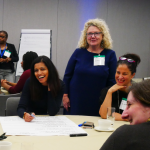Commemorating Windrush Day across East London
Today – 22nd June – marks the UK’s second ever official Windrush Day, in commemoration of the passenger liner Empire Windrush that docked at East London’s Tilbury Docks on 22nd June 1948. It was famously one of the first vessels to bring across passengers from the West Indies to the United Kingdom, following the end of the Second World War and the growing encouragement for Commonwealth citizens to emigrate here. Whilst campaigners have been petitioning for years for Windrush Day to be officially recognised, it wasn’t until the Windrush Scandal of 2018 – where it emerged that members of the Windrush generation had been wrongly detained and deported by the Home Office – that it was brought to national attention.
Today there are many communities across East London and beyond who are commemorating such a significant date in British history. Hackney Council’s annual ‘Windrush Generations Festival’ is this year running online. It includes music, storytelling and access to the archives of Hackney Archives and Hackney Museum, as well as a number of educational and cultural resources that are publicly accessible. The council are also commissioning a new public artwork that is being announced today specifically to commemorate the Windrush generation and their contribution to the Hackney community. Tower Hamlets council have teamed up with social enterprise Trapped in Zone One to encourage local people to create artwork to commemorate Windrush Day – submissions are open until 12th July and there are prizes for the best ones! The Royal Maritime Museum in Greenwich is hosting a panel discussion later today with leading historians, and also has lots of other resources and research materials on their website.
A member of Hackney Caribbean Elders Organisation, one of ELBA’s community partners, shared with us that “Windrush Day is like a bittersweet memory lane – reflecting on the pain and the gain”. This year, the day is being acknowledged amidst the backdrop of the Black Lives Matter movement, highlighting that whilst we should definitely be celebrating the contributions of the Windrush generation to this country and how far we’ve come in acknowledging the significance of the Black community in British history, there is still a lot more work that needs to be done. We need to continue raising our voices and challenging racial inequality, and celebrating the diversity of our communities. East London – and the UK as a whole – wouldn’t be the vibrant, creative and energetic place it is today without the contributions of the Windrush generation, and it’s important that we do them justice and ensure they are not forgotten.


